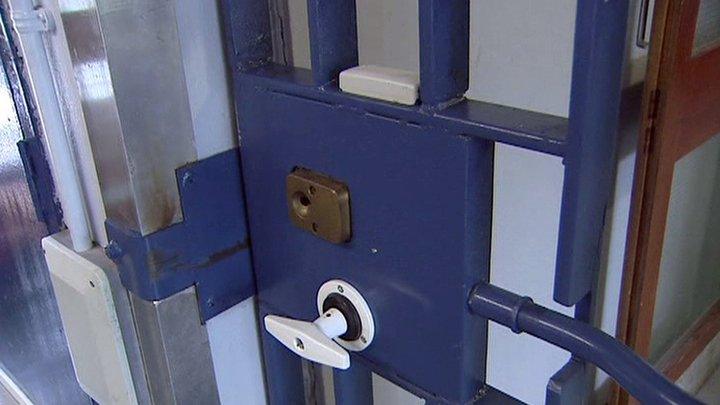Hydebank: Prison turns college to build brighter futures
- Published
Behind bars but keen to move on, Mark spoke to BBC News NI's Rick Faragher
The workshop at Belfast's newest college is full of students.
The sound of hammers and saws echoes across the leafy grounds on the outskirts of the city.
In the classes, young men make everything from bird boxes to furniture.
Many have lunch in the college's new café before an afternoon of gardening and working with animals. They are young men from all parts of Northern Ireland.
They are also being held at Hydebank Wood women's prison and young offenders' centre.
Each one is either on remand or serving a sentence for a criminal offence.
They share the site with about 40 women prisoners.
In April, the facility rebranded itself as a college. Nevertheless, when classes end, for these students, it is back to sleep in their cells.
In the light of a number of heavily critical reports, the prison was given a complete overhaul.
Hydebank Wood is the first young offenders' institution in the UK to try this fresh approach.
"Seventy per cent of our young men, when they were supposed to go to school, didn't," said prison governor Austin Tracey.
"They left with no education or qualifications. We've set our ambitions, as a college, to reach out to everybody."
He said the reinvention of Hydebank Wood was a watershed; a new way of thinking and learning for everyone.

Billy, 80, volunteers at Hydebank as a woodwork tutor and enjoys working with young people
The reaction from inmates, referred to strictly as "students" by prison staff, has been mostly positive.
One of these is Mark, 21, who was first sent to prison at just 13 years old.
He has 36 previous convictions. But, he said, this sentence would be his last.
He has been working closely with Billy, 80, a volunteer from Belfast who teaches woodwork.
"I do enjoy working with young people," he said.
"I really have a concern for them, for life, for their future and what the world has to offer them."
Billy said his family and friends initially found it "frightening" when he started volunteering at the prison, although they are supportive.
The pair have become good friends. Mark said their conversations about life and the future were helping him.
Class attendances are upwards of 90 per cent. Management said this was encouraging.

Back to school: Hydebank Wood turns college
But the dramatic transformation at Hydebank has not just been a shock for the inmates. Staff have also needed time to adjust.
Heather has been a prison officer for 15 years and recently began teaching craft classes at the site.
She said she got a mixed reaction from her colleagues.
"A lot were apprehensive. A lot said it would not work. They thought I should be doing my own job on the landings with them," she said.
But attitudes changed once staff saw a positive change in the behaviour and wellbeing of the prisoners.
Many suffer from a range of problems, stemming from isolation and being separated from their families and children, she said.
"We all have this fear of jail as a lonely place - 'no-one cares about me' - 'throw away the key'. It's not like that at all, We come across as a big family. We want to help people," she said.
Christina is new to prison. She has been at the college for a month and said the adjustment had been difficult, although the classes are proving therapeutic. Craft and cookery are among her favourites.
Many of the other women prisoners are also mothers, which, Christina said, has provided therapy of a different kind.
"At the end of the day they are all mums. Emotionally, we go through conversations in regards to family and children. Everybody has a different story."
Prison management admit that issues like drugs, mental health and self-harm are still a problem at Hydebank, but they are being addressed.
They said they measured the success of this reinvention by the high level of student engagement.
Reoffending rates among young male prisoners is about 70 per cent.
If Hydebank's radical approach proves a success, the secure college model could become a concept across the rest of the UK and Ireland.
- Published19 February 2014

- Published1 October 2013
